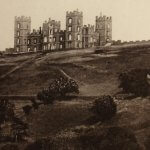By Vivienne Milburn FRICS Independent Antiques Auctioneer & Valuer
ONE of the fastest-growing areas of the auction world is the 20th century Modern Design market, following the article I wrote for Reflections in the March 2024 issue about the local silversmith and designer Brian Asquith. I was asked to sell Asquith’s workshop collection of stylish modern design items, including works designed by Dr Christopher Dresser.
Dr Dresser was a designer who was way ahead of his time. The dynamic toast rack and extraordinary teapot pictured here appear quite contemporary even for today. However, they were designed in the Victorian era in the 1880s.
Dr Dresser, who was born in 1834, was a designer and design theorist, now widely known as one of the first and most important independent designers.
He was a pivotal figure in the Aesthetic Movement and a major contributor to the Modern English style, both originating in England and having long-lasting international influence. Ironically, Christopher Dresser died in 1904 just at the start of the 20th Century design revolution.
Dresser was working during the age when everything was decorated, the Victorians were very keen on over-ornamenting things. Dresser rebelled against this in a major way. Many of his designs are completely devoid of ornamentation; their beauty coming from the form the object takes because of its function. This was all a good fifty years before anyone ever thought of “beauty coming from form and function”, which is the mantra of the 20th Century design revolution.
He did many designs working in ceramic and metalware, in particular as an Art Director of the Linthorpe Pottery in Middlesborough between 1879-1882. His designs were quite unique in comparison to any of his contemporaries at the time, such as John Ruskin and William Morris. Dresser fully accepted the implications of modern production techniques and addressed the importance of design rather than craftsmanship.
Some of his most interesting designs were for silver and electroplated nickel silver. He did designs for notable manufacturers such as Elkington, James Dixon and Hukin and Heath. From a decorative arts point of view, they are admired for their austere, simple geometric forms, which are unadulterated and honest in their production and very often exposing rivets and construction as part of the design.
His pieces are sometimes marked with his facsimile signature “Ch Dresser,” which is not always easy to read and sometimes missed by my clients. Some designs are still in production, such as his oil and vinegar sets and toast rack designs, now manufactured by Alessi – an Italian kitchen utensil and housewares company, selling a wide range of products by modern designers.
The provenance of the pieces featured here are from the Brian Asquith (1930-2008) workshop in Youlgrave. Brian Asquith was one of the principal figures in British silversmithing during the postwar years. With the revival of the British manufacturing economy and an ever-closer integration with the visual arts, there were exciting opportunities for those who chose to pursue a fine art or traditional crafts career.
Asquith and other contemporaries, such as David Mellor, Gerald Benney and Robert Welch, successfully straddled designing for the craft studio and the mass production of consumer goods.
Asquith studied at Sheffield College of Art, 1942-47, and then in 1951 at the Royal College of Art, where he studied sculpture under Frank Dobson and John Skeaping. Working in partnership with David Mellor in the metalware and product design workshop in Sheffield, 1955-60, he went on to establish his own design office in Sheffield, 1960-63, and then in Youlgrave from 1963. He designed for Redfyre, British Airways, Spear & Jackson, the Worshipful Company of Goldsmiths, the International Tennis Federation and the royal family.
Editor’s Note: Perhaps you also have modern design antiques and collectables that might be valuable? If so, it is worth getting the advice of an Independent Antiques Valuer to assess them. For further information please contact Vivienne Milburn on 01629 640210 or 07870 238788; or go to www.viviennemilburn.co.uk or email vivienne@viviennemilburn.co.uk






